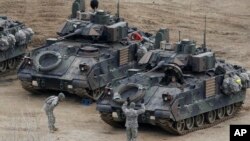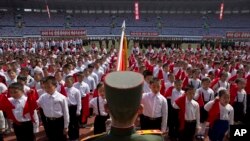SEOUL —
U.S. and South Korean forces remain on heightened alert for a possible North Korean missile test that officials say could take place at any time. A Japanese news media report Thursday said North Korea appeared to be preparing to launch a missile. But there has been no announcement from North Korea on any imminent launches.
South Korea's ministry of national defense says it cannot confirm a report that a North Korean missile launcher has been observed in a “raised position.”
Japan's Kyodo news agency issued such a dispatch, quoting a source in the Japanese defense ministry.
In Seoul, Ministry of National Defense spokesman Kim Min-seok said it is anticipated that a firing of one or more missiles will occur before or around next Monday, the birth anniversary of North Korea's founder Kim Il Sung. But he said little else about is known.
"Nobody knows if North Korea is going to launch a missile, how many and whether it will head towards the east coast, the Philippines or our southern coast," said Kim.
The South's defense ministry spokesman adds that he cannot confirm reports that North Korea is moving around its missile launcher vehicles to confuse intelligence monitoring and thwart South Korea and the United States from determining the precise moment of launch.
Media reports say a pair of Musudan intermediate range ballistic missiles is being shuffled in and out of a shed in the port city of Wonsan, while up to five transport erector-launcher vehicles are moving around South Hamgyeong province.
Before previous launches, North Korea notified mariners and commercial aviators of its intent to conduct missile tests. There have been no such announcements, so far, from Pyongyang. And, there have been no indications that the North has mobilized its large army.
Other forces in the region remain on high alert, in case of any military provocation by North Korea.
The U.S. Navy has two anti-missile destroyers in waters off the peninsula. It has also moved a sea-based 85-meter tall radar platform into position in the Pacific.
South Korea's military has ships equipped with the advanced Aegis missile-tracking radar system. It also has deployed anti-missile Patriot class batteries and observation aircraft, as part of a coordinated effort to track and possibly shoot down any missile over the country.
Japan has set up anti-missile PAC-3 batteries in various locations. Prime Minister Shinzo Abe has ordered them to be used to intercept any missile that might cross over the country and destroy any falling debris from a multi-stage flight.
Japan's chief cabinet secretary, Yoshihide Suga, says Tokyo has told Pyongyang, via diplomatic channels, to halt its provocations.
Suga says every possible measure is being taken to protect Japanese people's lives and ensure the country's security.
For the first time, Thursday, North Korea's state media mentioned, by name, South Korea's president, who was inaugurated on February 25.
A radio announcer, reading a dispatch from the Korean Central News Agency, says the “Park Geun-hye regime stands for confrontation” with North Korea, adding the “chief executive” in the South cannot shirk responsibility for the risk of failure of the Kaesong Industrial Zone.
Hours later in Seoul, the cabinet minister in charge of relations with the North stepped before a microphone at the Ministry of Unification.
Unification Minister Ryoo Kihl-jae says “North Korea must favor discussion for issues that it wants to raise.”
But when pressed on whether he was calling for two-way official talks, Ryoo explained "that rather than a proposal for dialog" his statement is intended as a pronouncement on the need for dialog to resolve outstanding problems, such as the Kaesong project and "North Korea's increasing threatening actions."
This week, North Korea pulled its 53,000 workers out of the factory complex, the only remaining joint project between the two Koreas. It has refused to issue permits for South Korean managers and cargo trucks to enter the complex, last week.
The high tension on the peninsula has prompted Taiwan to issue a travel alert to its citizens. Its foreign ministry is advising Taiwanese to delay travel to South Korea because the situation is “unclear.”
A foreign ministry spokesman in Seoul told reporters Thursday there is no reason for anyone to avoid visiting South Korea.
A North Korean peace committee, which is a government agency, issued an appeal this week to foreigners in South Korea that, in consideration for their own safety, they should leave the country.
That appears to have been largely ignored by expatriates and tourists in South Korea.
Last week, North Korea asked diplomats in Pyongyang to devise embassy evacuation plans by Wednesday, contending war could break out at any time.
South Korea's ministry of national defense says it cannot confirm a report that a North Korean missile launcher has been observed in a “raised position.”
Japan's Kyodo news agency issued such a dispatch, quoting a source in the Japanese defense ministry.
In Seoul, Ministry of National Defense spokesman Kim Min-seok said it is anticipated that a firing of one or more missiles will occur before or around next Monday, the birth anniversary of North Korea's founder Kim Il Sung. But he said little else about is known.
"Nobody knows if North Korea is going to launch a missile, how many and whether it will head towards the east coast, the Philippines or our southern coast," said Kim.
The South's defense ministry spokesman adds that he cannot confirm reports that North Korea is moving around its missile launcher vehicles to confuse intelligence monitoring and thwart South Korea and the United States from determining the precise moment of launch.
Media reports say a pair of Musudan intermediate range ballistic missiles is being shuffled in and out of a shed in the port city of Wonsan, while up to five transport erector-launcher vehicles are moving around South Hamgyeong province.
Before previous launches, North Korea notified mariners and commercial aviators of its intent to conduct missile tests. There have been no such announcements, so far, from Pyongyang. And, there have been no indications that the North has mobilized its large army.
Other forces in the region remain on high alert, in case of any military provocation by North Korea.
The U.S. Navy has two anti-missile destroyers in waters off the peninsula. It has also moved a sea-based 85-meter tall radar platform into position in the Pacific.
South Korea's military has ships equipped with the advanced Aegis missile-tracking radar system. It also has deployed anti-missile Patriot class batteries and observation aircraft, as part of a coordinated effort to track and possibly shoot down any missile over the country.
Japan has set up anti-missile PAC-3 batteries in various locations. Prime Minister Shinzo Abe has ordered them to be used to intercept any missile that might cross over the country and destroy any falling debris from a multi-stage flight.
Japan's chief cabinet secretary, Yoshihide Suga, says Tokyo has told Pyongyang, via diplomatic channels, to halt its provocations.
Suga says every possible measure is being taken to protect Japanese people's lives and ensure the country's security.
For the first time, Thursday, North Korea's state media mentioned, by name, South Korea's president, who was inaugurated on February 25.
A radio announcer, reading a dispatch from the Korean Central News Agency, says the “Park Geun-hye regime stands for confrontation” with North Korea, adding the “chief executive” in the South cannot shirk responsibility for the risk of failure of the Kaesong Industrial Zone.
Hours later in Seoul, the cabinet minister in charge of relations with the North stepped before a microphone at the Ministry of Unification.
Unification Minister Ryoo Kihl-jae says “North Korea must favor discussion for issues that it wants to raise.”
But when pressed on whether he was calling for two-way official talks, Ryoo explained "that rather than a proposal for dialog" his statement is intended as a pronouncement on the need for dialog to resolve outstanding problems, such as the Kaesong project and "North Korea's increasing threatening actions."
This week, North Korea pulled its 53,000 workers out of the factory complex, the only remaining joint project between the two Koreas. It has refused to issue permits for South Korean managers and cargo trucks to enter the complex, last week.
The high tension on the peninsula has prompted Taiwan to issue a travel alert to its citizens. Its foreign ministry is advising Taiwanese to delay travel to South Korea because the situation is “unclear.”
A foreign ministry spokesman in Seoul told reporters Thursday there is no reason for anyone to avoid visiting South Korea.
A North Korean peace committee, which is a government agency, issued an appeal this week to foreigners in South Korea that, in consideration for their own safety, they should leave the country.
That appears to have been largely ignored by expatriates and tourists in South Korea.
Last week, North Korea asked diplomats in Pyongyang to devise embassy evacuation plans by Wednesday, contending war could break out at any time.






